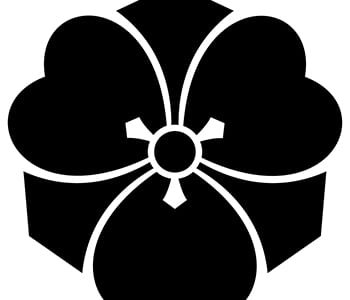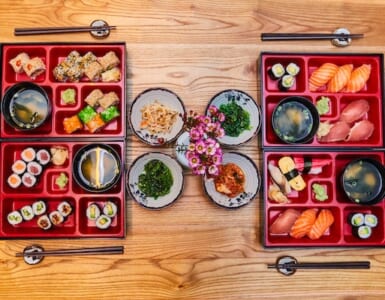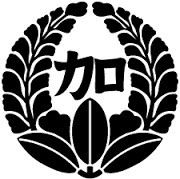Basic Japanese conversation phrases can help you go through most situations in Japan. Once you learn the expressions we’ve listed here, you will handle situations easily. Being a good listener and humble are keys to doing well. So, let’s grab some expressions and try them for yourself!

Table of Contents
1. Essential Greetings – Basic Japanese Conversation

-
- おはようございます – Ohayou gozaimasu (Good morning)
You use this greeting in the morning by noon. You can say “Ohayo” to your friends.
-
- こんにちは – Konnichi wa (Hello)
In the afternoon, you say Konnichiwa by six in the evening or so.
-
- こんばんは – Konban wa (Good evening.)
If you encounter anyone after six, it’d be appropriate to greet them with “Konban wa”.
-
- お久しぶりです – Ohisashiburi desu. (Long time no see.)
When you meet your friends for the first time in a while, you say Ohisashiburi desu. Or if you are close to them, you say “Hisashiburi.” Then, the following expression should follow.
-
- お元気ですか? – Ogenki desu ka? (How are you doing?)
You can say “Genki?” to ask how they are doing if they are close friends.
-
- どうしてましたか? – Dou shitemashita ka? (How have you been doing?)
Ask them what they have been doing for about some months or years.
-
- 何かありましたか? – Nanika arimashita ka? (Anything new?)
They would tell you any updates you may not know.
2. Frequency Expressions – Basic Japanese Conversation

-
- いつも – Itsumo (Always)
You can say to your co-worker “Itsumo hayai desu ne.” (You always come here early.) At the office or any workplace will do.
-
- だいたい – Daitai (Usually)
Daitai juuichiji niwa nemasu. – I usually go to sleep at 11.
-
- しばしば – Shibashiba (Often)
Shibashiba kuruma wo tsukaimasu. – I drive a car often.
-
- たまに – Tamani (Occasionally)
Tamani otera ni ikimasu. – I occasionally visit a temple.
-
- まれに – Mareni (Rarely)
Goku mareni kanojo ni aimasu. – I rarely see her.
-
- ぜんぜん – Zenzen (Never)
Karenokotowo zenzen rikai dekinai. – I never understand him.
3. Ordering Foods and Drinks – Basic Japanese Conversation

-
- メニューをいただけますか? – Menyu wo itadake masu ka? (Can I have a menu?)
- これは何ですか? – Korewa nan desu ka? (What is this?)
You can always ask a waitress/waiter or a barista what the menu suggests.
-
- これはいくらですか? Korewa ikura desu ka? (How much is it?)
- 砂糖は入っていますか? Satou wa haitte imasu ka? (Does it contain sugar in it?)
You may want to ask a barista if your drink contains any sugar. Or you can replace “砂糖 – Satou (sugar)” with “牛乳 – Gyuunyuu (milk)” or any other stuff you want to make sure to avoid or to have.
-
- ブラックでお願いします。 – Burakku de onegai shimasu. (I want it black.)
When you order a cup of coffee at a coffee shop or a restaurant, you can tell them you want your coffee without any sugar or milk this way.
- 辛いですか? – Karai desu ka? (Is it spicy?)
- はい – Hai (Yes)
- いいえ – Iie (No)
- すみません – Sumimasen (Excuse me.)
4. Introducing Yourself – Basic Japanese Conversation

-
- 私は ___ といいます。 – Watashi wa ___ to iimasu. (I am ___.)
You can put your name in ___ to introduce yourself. If you want to be very polite, say “Watashi wa ___ to moushi masu.”
-
- 私は ___ から来ました。 – Watashi wa ___ kara kimashi ta. (I am from ___.)
- 私は ___ をしています。 – Watashi wa ___ wo shite imasu. (I work as ___.)
You can put any occupation like a writer, singer, salesperson, shop clerk, programmer, cook, teacher, etc…
-
- 私は学生です。 – Watashi wa gakusei desu. (I am a student.)
- 私は ___を勉強しています。 – Watashi wa ___ wo benkyo shite imasu. (I study ___.)
Alternatively, you can say
- 私は ___ に住んでいます。 – Watashi wa ___ ni sunde imasu. (I live ___.)
- 私は ___ が好きです。 – Watashi wa ___ ga suki desu. (I like ___.)
5. Courtesy Expressions – Basic Japanese Conversation

-
- ありがとう – Arigatou (Thank you.)
- ありがとうございます – Arigatou gozai masu. (Thank you very much.)
- すみません – Sumimasen. (Excuse me.)
- ごめんなさい – Gomennasai. (I’m sorry.)
“I’m sorry.” can be translated as “Sumimasen” as well. It can be confusing, but you can say “Sumimasen” in both situations when you want someone’s attention and want to express your apology. But you would do fine sticking with “Gomennasai” when you feel sorry.
-
- ちょっといいですか? – Chotto ii desu ka? (Could you give me a second?)
You can alternatively say, “少しお時間よろしいですか – Sukoshi ojikan yoroshii desu ka?” which sounds a little more polite.
-
- ___ してくださいますか? – ___ shite kudasai masu ka? (Would you please do ___?)
You can use this expression when you want to ask someone to do something in your favor. You can ask your friend the same thing with “___ してもらってもいい?” (Can you do me a favor?), but it’s always a good idea to stick to the more polite expression with anyone outside your circle.
6. 5W1H Questions to clarify things – Basic Japanese Conversation

-
- これは何ですか? – Korewa nan desu ka? (What is it?)
- あれは何ですか? – Are wa nan desu ka? (What is that?)
- 誰ですか? – Dare desuka? (Who is it?)
If you want to sound more polite, you can say “こちらはどちらさまですか? – Kochira wa dochirasama desu ka?”
-
- どこですか? – Doko desu ka? (Where is it?)
You can point to something/somewhere to get a clear answer. Where is it?
-
- いつですか? – Itsu desu ka? (When is it?)
You ask this when you want when something will happen, such as some events or projects.
-
- なぜですか? – Naze desu ka? (Why is it?)
You can say “なんで? – Nande?” (Why?) if you talk to a close friend. “なんでそれが起きたの? – Nande sore ga okita no?”(Why did it happen?)
-
- どのように? – Donoyouni? How?
You can alternatively say “どうやって – Douyatte/ どう – Dou” (How). “どうやってやったの? – Douyatte yatta no?” You’re asking how did someone do something.
7. Everyday Expressions- Basic Japanese Conversation

-
- 今何時ですか? – Ima nanji desu ka? (What time is it right now?)
- 今 – Ima (Now)
- 後で – Ato de (Later)
- 今日 – Kyou (Today)
- 昨日 – Kinou (Yesterday)
- 明日 – Ashita (Tomorrow)
- 今年 – Kotoshi (This year)
- 去年 – Kyonen (Last year)
- 来年 – Rainen (Next year)
- 月曜 – Getsuyou (Monday)
- 火曜 – Kayou (Tuesday)
- 水曜 – Suiyou (Wednesday)
- 木曜 – Mokuyou (Thursday)
- 金曜 – Kinyou (Friday)
- 土曜 – Doyou (Saturday)
- 日曜 – Nichiyou (Sunday)
- 毎日 – Mainichi (Everyday)
- トイレはどこですか? – Toire wa doko desuka? (Where’s the bathroom?)
An alternative term for the “Toire” (bathroom) is “Otearai”. You can ask “Otearai wa doko desuka?” and it sounds more polite.
Let us give you some fillers to make you sound like a Japanese native. You can use them when words are lost but try not to use them too much, as they sound annoying and unprofessional.
- ええと… – Eeto… (Well…)
- それで… – Sorede… (And then…)
It’s always good to know valuable expressions. Let me know through the comment section if there are any expressions you want to say that you don’t find here. それでは、また! – Sorede wa mata! (See you again soon!)
Related Article
Best Way to Learn Japanese on Your Own: Effective Mindset and Tools








Add comment